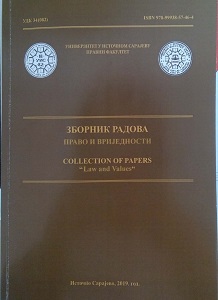Лојзиду и Банковић: супротна тумачења члана 1 Европске конвенције о људским правима и универзалне вредности
Loizidou and Bankovic: Contrary Interpretations of Article 1 of the European Convention on Human Rights and Universal Values
Author(s): Rodoljub Etinski
Subject(s): International Law, Human Rights and Humanitarian Law, EU-Legislation
Published by: Правни факултет Универзитета у Источном Сарајеву
Keywords: Interpretation; European Convention on Human Rights; Jurisdiction;
Summary/Abstract: The European Court of Human Rights (hereinafter: the ECtHR or the Court) has applied the same rules on interpretation of international treaties, as they are codified in Articles 31 and 32 of the Vienna Convention on the Law of Treaties to interpretation of Article 1 of the European Convention on Human Rights (herein- after: the Convention) in the cases Loizidou 1995 and Bankovic 2001. The Court interpreted Article 1 to answer the same question about extraterritorial effects of the Convention in both cases. Article 1 reads: “The High Contracting Parties shall secure to everyone within their jurisdiction the rights and freedoms defined in Section I of this Convention.” The focus was on the words “within their jurisdiction”. By applying the same rules on interpretation on the same provision of the Convention, the ECtHR gave two different answers to the same question. The rules on interpretation of international treaties do not exclude a possibility of contrary outcomes of the process of interpretation. They leave enough broad discretion to an interpreter to choose one among possible interpretations. Choosing among available means of interpretation and attributing different significance to some of them, an interpreter chooses one among possible interpretation. Having emphasized importance of the purpose and object of the Convention and particular nature of the Convention in the Loizidou case, the Court found that “the concept of ‘jurisdiction’ under Article 1 is not restricted to the national territory of the High Contracting Parties” (para. 62). Shifting emphasize to the preparatory work, the comparative practice and the particular function of Article 1 in the Convention in the Bankovic case, the Court came to the opposite interpretation.The different choice of the European Court of Human Rights in the two cases is considered in the light of universal values. The preamble of the Universal Declaration on Human Rights and its Article 28 can and should constitute the framework of relevant values. The framework requires a broad interpretation of Article 1 of the European Convention on Human Rights.
- Page Range: 12-30
- Page Count: 19
- Publication Year: 2019
- Language: Serbian
- Content File-PDF

